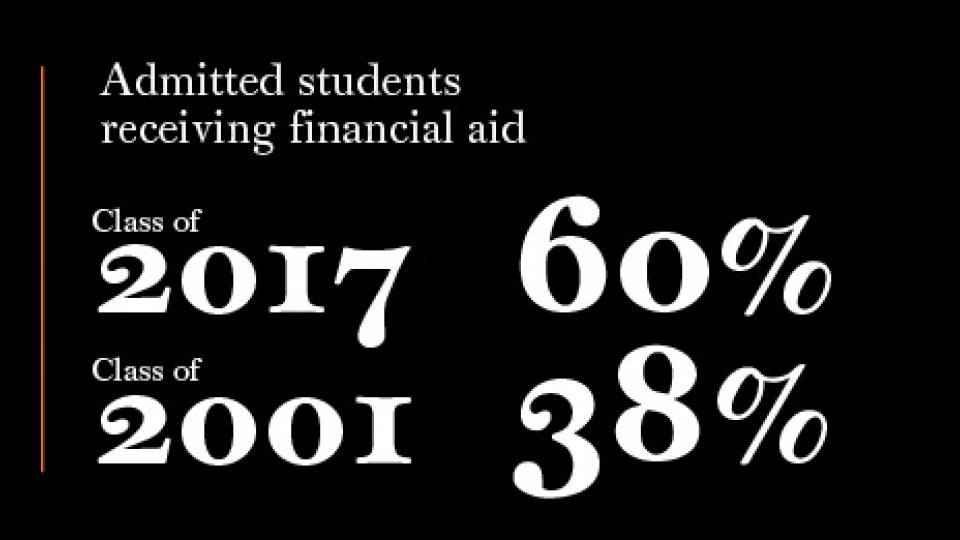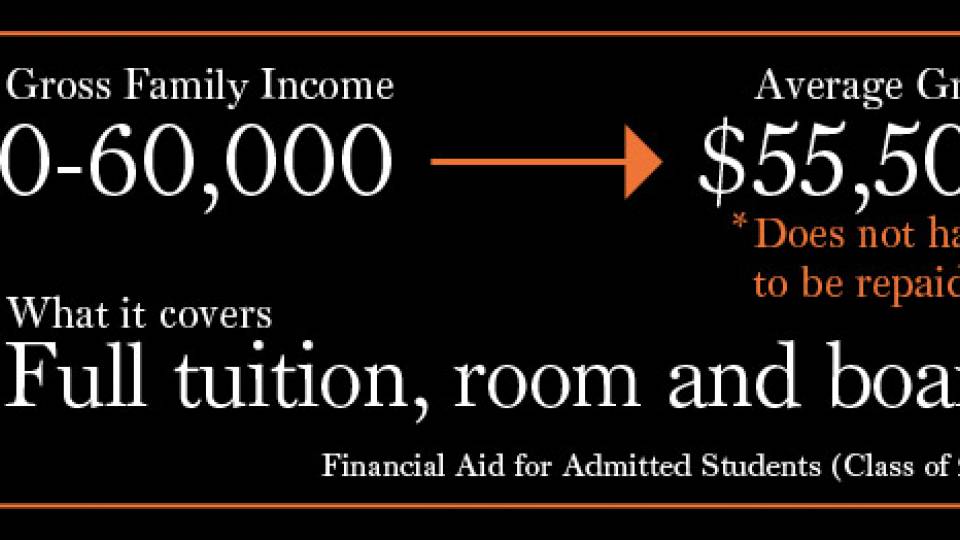Princeton University trustees Jan. 26 approved a 4.6 percent increase in undergraduate financial aid in the operating budget for 2013-14, which includes a 3.9 percent increase in tuition, to $40,170.
Students who are receiving financial aid will not see an increase in the amount they pay because aid packages are automatically adjusted to compensate for changes in fees. The average aid package for a student admitted to the Class of 2016 is $39,700.
"Once again Princeton's financial aid expenditures will rise faster than its fee package," Provost Christopher Eisgruber said. "The growth of the scholarship budget to $121.4 million will maintain Princeton's commitment to making its education affordable to any student who is admitted, regardless of ability to pay and without the need for loans."
The University's pioneering no-loan financial aid program, which enables Princeton students to graduate with the lowest student debt among national universities, meets the full need of students on aid, and extends to some families making more than $250,000 per year. Sixty percent of the student body receives financial aid.
Lower net cost
For the past 16 years, Princeton's average annual fee package increase has been among the lowest in the nation while its scholarship spending has outpaced fee increases for a decade. As a result, the average "net cost" for Princeton students today is lower than it was in 2001, even before adjusting for inflation.
The total undergraduate fee package increase of 3.8 percent includes the 3.9 percent tuition increase to $40,170; a 3.9 percent increase in room charges to $7,220; and a 3.2 percent increase in board rates, to $5,860 for a full meal plan.
Eisgruber said that while the increase in the total fee package ensures that the University maintains excellence and its education remains a good value for all students, it will still keep Princeton at the bottom of its comparison group, with its fees for next year falling about $1,000 below this year's fee package of its closest competitor.
The approved budget also includes a 3.9 percent ($1,520) increase in the regular graduate tuition, from $38,650 to $40,170, the same as undergraduate tuition; a comparable increase in the Dissertation Completion Enrollment (DCE) graduate tuition, from $2,930 to $3,040; and an increase in the Student Health Plan fee from $1,850 to $1,900.
In adopting the $1.58 billion budget, which is 4 percent larger than this year's budget, the trustees also approved an increase of approximately 3 percent in faculty and staff housing rates, and increases ranging from 3 percent to 4 percent in graduate student apartment rates.
The budget includes a 3 percent increase in graduate student stipends and an additional allocation that will enable the University simultaneously to simplify its stipend structure and to make its fellowship offers more attractive to prospective students.
The budget proposal, which was presented to the trustees by President Shirley M. Tilghman during a meeting Jan. 26, was based on the recommendations of the Priorities Committee of the Council of the Princeton University Community. The committee reviews the University's operating budget each year. The Provost chairs the committee, whose membership includes faculty, students and staff.
Maintaining best talent
Eisgruber said the budget provides for salary increases through two salary pools: a modest base pool that reflects the University's low-inflation environment and a slightly enhanced central pool that will help the University attract and retain the best faculty and staff in the face of external competitive pressures.
Eisgruber pointed out that while the University was able to absorb some of the impact from steadily rising labor costs because of exceptionally healthy growth in the endowment in recent years, similarly favorable investment conditions are not likely to recur in the near future, so the University needs to manage future growth carefully.
The University now has more accurate models for projecting the long-term budgetary impact of new academic initiatives and faculty searches; the vice president of human resources is focused on trends in the growth of the number of employees; and a review of the staff compensation structure is under way, Eisgruber said.
Eisgruber lauded all members of the University community for their contributions toward helping the University operate more efficiently and eliminate deficits that developed during the economic recession. As a result, the University balanced the budget in the last financial year without drawing on one-time reserves as expected.
"Every academic and administrative unit repeatedly hit the targets that we established at the time of the downturn," Eisgruber said. "We will need to sustain that financial discipline in the years ahead. The University must continue to replenish the reserves that we drew upon to weather the financial crisis."
Eisgruber said that since its inception three years ago, SUMAR ("Strengthening University Management and Resources"), a committee that meets regularly to design and implement cost-saving strategies, has tracked about 60 proposed initiatives that are expected to save the University more than $15 million annually.
SUMAR's five priorities are multi-year energy and utility savings, reforming the human resources compensation process, procurement efficiency, financial management tools, and managing health care costs.
High-priority initiatives
The approved budget includes $1.2 million for programmatic recommendations, up from $500,000 last year, to support important University priorities, including internationalization, online presence, career services and placement, graduate stipends, sustainability, compliance, and employee benefits.
Some of the high-priority initiatives that will receive funding include:
- hiring a manager of international appointments in the Office of the Dean of the Faculty to ensure that the University remains compliant with numerous legal requirements;
- hiring a librarian to assist scholars navigate the complexities of copyright policies, negotiate with publishers, and include their work in a new online open access database of articles by Princeton researchers;
- adding staff support for undergraduate and graduate competitive fellowship advising; and
- hiring an executive director in the Office of Career Services to provide strategic leadership and develop high-level external relations.
The Priorities Committee report is available for download in PDF format as well as from the Office of the Provost.

